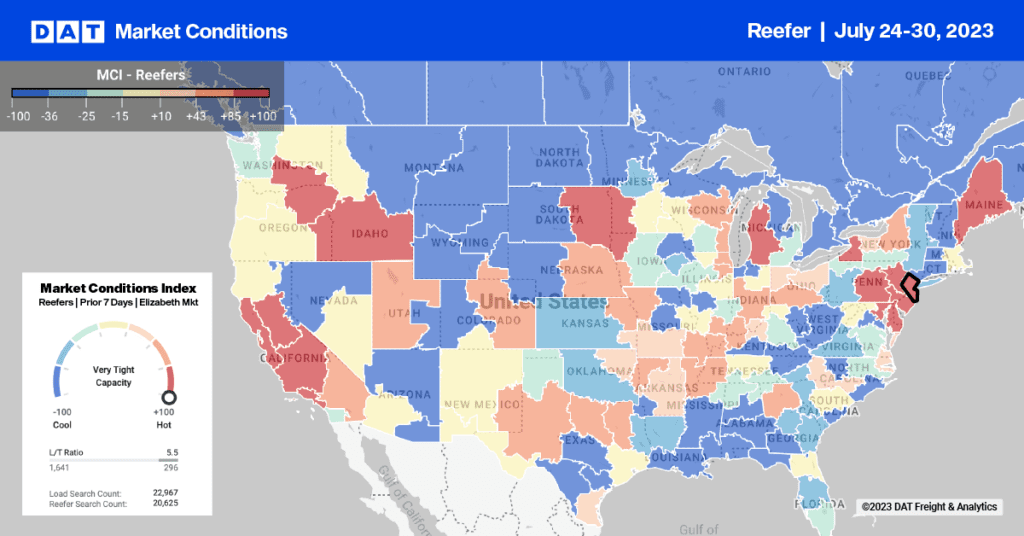Last week’s rate trend was mixed to down, depending on your equipment type and geographic region.

Van rate trends were mixed, reefer rates accelerated their seasonal decline, and flatbed rates remained solid in the week of July 29 through August 4, compared to the previous week.
VAN – Memphis and Stockton heat up, as rates decline in Atlanta
Rates increased last week in many van lanes last week, but the national average declined, a typical move for late July and early August.
For a good rate, try Memphis, a hot market for vans. Outbound rates from the Bluff City increased 4.2% compared to the previous week. Attractive rates emerged from California, as well, especially in Stockton, up 3.9% and in Los Angeles, up 1.4%.
High-paying lanes included Stockton to Salt Lake City, a standout for the week. Rates there gained $0.23 (9%) to an average of $2.81 for the week. L.A. to Phoenix paid $2.58 per mile, including fuel, but the return rate was one of the week’s lowest at $1.12. Try returning via San Diego and taking a short haul from there to L.A. for a better rate.
Below-average rates and declining, Atlanta gave up 3.2% on rates last week, contributing to a four-week slide of 11% from that market. Charlotte rates rose 1.4% last week, but not enough to offset a 12% decline for the most recent four weeks. The lane from Atlanta to Philadelphia lost $0.20 (12%) to $1.97 per mile, which is still well above the national average of $1.82 but it may slip further. The return trip also lost ground, slipping by $0.10 to $1.21 per mile, and the rate from Charlotte to Philadelphia dropped to $1.16.
REEFER – Drought shrivels rates and freight flows
There were not a lot of bright spots for reefer carriers last week, as the drought coincides with normal seasonal trends to dry up traffic and rates. Of the 64 top reefer lanes measured, only 17 had increases last week, while 44 declined and 3 were neutral, compared to the previous week.
First , the good news: Los Angeles rates clicked up to $2.55 per mile, a 0.6% increase, and Sacramento lost 0.6% but paid an average of $2.62, the strongest of the major markets.
The biggest increase was from Sacramento to L.A., which gained $0.41 (21%) to $2.36. Top lane rate in the country was from Elizabeth to Boston at $2.89 per mile, even after a $0.23 decline. This is a challenging lane in a dense, urban corridor.
The long list of declining markets included Lakeland, down 5.6% to $1.40 and Phoenix, down 5.5% to a respectable $2.21.
The worst lane for reefers was Lakeland to L.A., at $1.20 per mile after a $0,10 dip. The low rate makes sense, as this lane links the weakest U.S. market to one of the strongest, and the route is one of the longest hauls possible.
FLATBED – It looks like June again in Rock Island
National average rates for flatbeds remained stable last week, but rate increases in some major markets showed unusual strength for this time of year. A possible explanation is that extremely dry weather boosts construction even as it ruins crops. Optimists may see high flatbed rates as an indicator of emerging economic health.
Rate increases of more than 12% reward flatbed carriers outbound from Rock Island IL, returning rates to their late-June levels of $2.56 in this regional freight hub on the Mississippi River. Back East, outbound rates rose 5.7% from Baltimore to $2,30, and 4.1% from Roanoke VA, to $2.63 per mile, including fuel.
Rates rose on four key lanes from Rock Island to Indianapolis (up 16% to $2.13) and other Midwestern markets within a 360-mile radius. Flatbeds also got $0.42 (15%) more per mile on the lane from Roanoke to Baltimore, which paid an average of $3.14 last week.
On the down side, Atlanta rates slipped 5.1%, and Phoenix lost 3.8%. Florida showed weakness in flatbed as well as other trailer types, with Tampa down 4.6% for the week.
The lane from Tampa to Atlanta had the lowest rate among the top 76 surveyed, with a decline of $0.11 to $1.32 per mile. Ouch.


